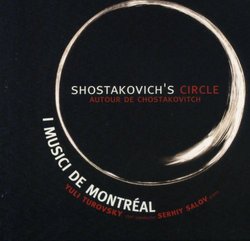CD Details
All Artists: German Germanovich Galynin, Dmitry Shostakovich, Galina Ustvolskaya, Yuli Turovsky, I Musici de Montréal, Serhiy Salov
Title: Shostakovich's Circle / Autour de Chostakovitch
Members Wishing: 0
Total Copies: 0
Label: Analekta
Original Release Date: 1/1/2006
Re-Release Date: 4/6/2007
Genre: Classical
Styles: Chamber Music, Forms & Genres, Concertos, Historical Periods, Classical (c.1770-1830), Instruments, Keyboard
Number of Discs: 1
SwapaCD Credits: 1
UPC: 774204989828 |
Synopsis
Album DescriptionGerman (or Hermann) Galynin (also spelled Galinin; accent on the second syllable) had the misfortune to live under the dark shadow of Stalin's suffocating cultural policies, and he has remained almost totally unknown outside of Russia. Yuli Turovsky, acting on memories of having performed some of Galynin's music before emigrating from Moscow in 1976, and with the aid of colleagues still living there, has undertaken to bring his music to the west. The Third Quartet was written in 1946, three years after the Eighth Symphony, one of Shostakovich's trilogy of "War" symphonies (Nos. 7, 8 and 9). The Third Quartet bears striking resemblances to this symphony. Both works are in five movements, both are artistic statements born of tragedy and suffering, and while the Quartet, at about 35 minutes is not as long as the sixty-minute symphony, each is a work of grand scale and proportion. Furthermore, each contains a brutal, march-like second movement, a third movement depicting the destructive power of war, and a fourth in the form of a passacaglia, "a requiem in [its] depth of inner sorrow" in the words of Yoritoyo Inouye. The quartet's first movement opens with a seemingly light-hearted theme set to the polka rhythm, but there is an almost relentless undercurrent of mordant wit and grotesquerie throughout. This is not happy music. The finale offers a note of tentative hope, of smiling through the tears. The seventeen-minute concerto is in a single movement consisting of several linked episodes. A rhythmic figure (short-long, short-long) announced by the soloist and repeated by strings in the opening bars (Lento assai) serves as the pervasive unifying motif of the concerto. A sudden change of pace (Allegro moderato) brings a headlong rush of sixteenth notes, with piano and strings passing musical material playfully back and forth. Another sudden change of tempo brings the Andante cantabile, which begins dolce and rises to a peak of intensity before the arrival of the passage marked "Cadenza," surely one of the strangest in the repertory inasmuch as it offers no opportunities whatsoever for displays of temperament or virtuosity. Next comes a Largo interlude. This slowly gains momentum until the music is essentially moving along in a healthy allegro tempo. The remainder of the concerto consists of an almost obsessive development of the short-long rhythmic motif that introduced the work, culminating in a grandiose peroration in C major.
| |
CD Reviews
Two Discoveries, Plus an Old Friend in New Guise J Scott Morrison | Middlebury VT, USA | 05/09/2006 (5 out of 5 stars) "Yuli Turovsky, the founder and director of I Musici de Montreal, must be credited with bringing out this marvelous new CD of music by Shostakovich and two of his close colleagues, German Galinin and Galina Ustvolskaya in works that were all written in 1946 in immediately post-war Russia. An old friend in new garb is Shostakovich's Third String Quartet, in F, Op. 73, as orchestrated for string orchestra, winds and harp by Rudolf Barshai, given opus number 73a. It is given a fresh, invigorating performance by Turovsky and his band. (This is not to be confused with Barshai's more familiar orchestration of the Eighth Quartet, which is also called a Chamber Symphony, designated Op. 110a.)
As well, we are happy to have the Piano Concerto by Galina Ustvolskaya, one-time student of Shostakovich (whom he asked to marry him early in the 1940s; she chose not to). This is an early work and is not entirely typical of her later style which tends to be hard-edged and percussive (one Dutch wit called her 'The Woman with a Hammer'). It is in one movement, but divided into several discernible sections, and lasts about seventeen minutes. It is by far the most 'romantic' of her compositions, and is more or less in C major/minor.
The most amazing and immediately appealing of the works here is the First Piano Concerto by German (or Herman) Germanovich Galinin (sometimes transliterated as Galynin, accent on the second syllable), an almost completely unknown Russian composer who also was a student of Shostakovich's. Indeed, this concerto reminds one of Shostakovich's own First Concerto with its brashness, fresh high spirits underpinned by a shy melancholy (especially in the long second movement). The rondo finale dispels earlier sadness and finishes in a blaze of pyrotechnics. Entirely tonal, brilliantly orchestrated, this concerto, receiving its first recording outside Russia, is a triumph and I can easily imagine it being taken up by pianists looking for new material; I am thrilled to have made its acquaintance.
The pianist in the two concerti is the very young Ukrainian, Sergei Salov (his first name is transliterated as 'Serhiy' in the Analekta booklet notes, but I notice that when he played this concerto with I Musici de Montreal in a concert last year their press release referred to him by the more familiar 'Sergei'). He is a very fine pianist whose fingerwork is pristine and his ability to mold a phrase preternaturally musical.
I would recommend this CD for the Galinin concerto alone, but both the Ustvolskaya concerto and the Shostakovich chamber symphony are given exceptional performances. Sound is excellent.
Scott Morrison"
|


 Track Listings (9) - Disc #1
Track Listings (9) - Disc #1